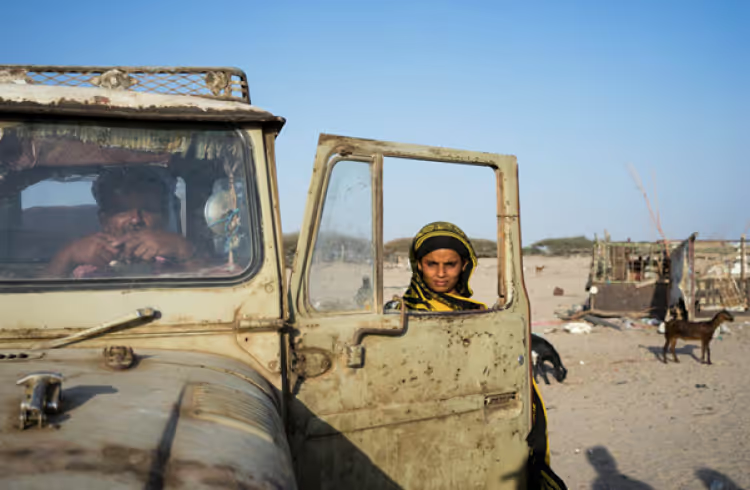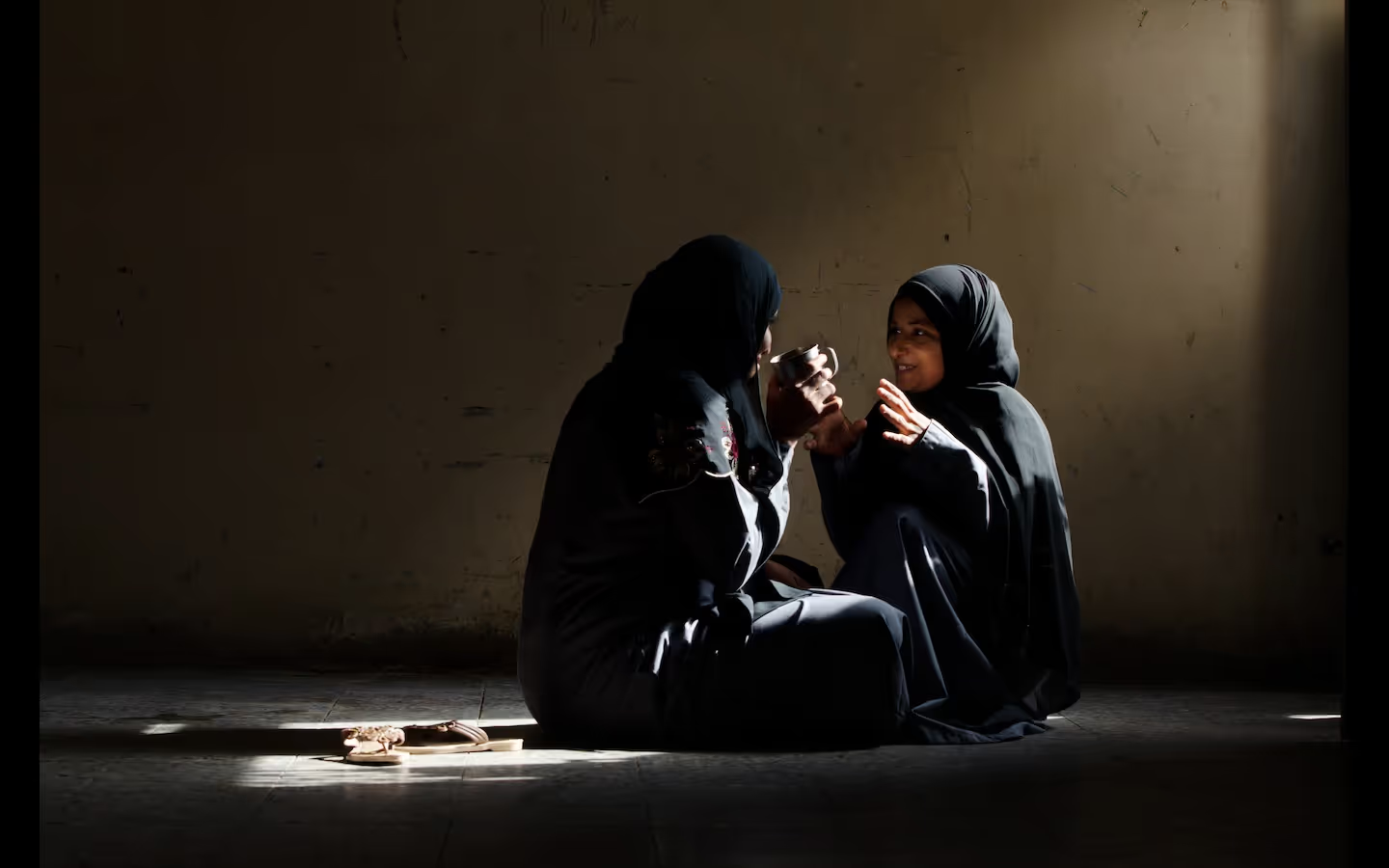Amira Al-Sharif: ‘The Wheel of War is in the Hands of Men’

With only faint hopes for peace in Yemen, photojournalist Amira Al-Sharif reflects on documenting history, the situation of women and girls in her own country, and her experiences in exile.
Following the end of her ICORN residency in 2021, Amira remains in Paris, where she has continued her journalistic work whilst exploring other creative avenues, including a Master’s degree in audio-visual arts, focusing on the topic of ‘Invisible Pathways: Sound as Memory and Identity’.
Yet, Al-Sharif continues to ask questions about the devastating consequences of the ongoing war in Yemen and through her upcoming book His Weapons Are Not Wise, Amira discussed the photo of 16-year-old Arzaq shown above:
‘In early 2016, I met a 16-year-old nomad named Arzaq as she watched over her family’s herd of goats inside a remote Emirati military-controlled landfill in south Yemen, just west of the de facto capital Aden. Toxic smoke and pollution billowed overhead while a handful of my countrymen and women scoured the towering, disorderly, and fetid mounds for items to either consume or sell. Arzaq’s father sat inside his parked pickup, a rundown yet vital mode of transportation for hundreds of nomads otherwise isolated. Their poverty-stricken community dwells in a nearby makeshift settlement, without access to basic services like food, water, sanitation, healthcare, and education; their desert-weathered abodes set alongside two rusted-out British-made trucks, relics of the Crown’s occupation of south Yemen from 1937 to 1963. The presence of a nearby Emirati military base — a contemporary occupying force — is observed and felt across the lengthy scars of Arzaq’s older brother, who was once struck in the back by bullets fired from the foreign power’s thermal defence system after he was misidentified as an enemy fighter. He was simply walking to the landfill one night in search of food for the family’s hungry herd.
Arzaq’s stare is one of composed anger and sustained disappointment. Beside her is, symbolically speaking, yet another machine of war being led by yet another man. And behind her is what she is able to lead in this life: goats.’
Amira Al-Sharif has over 19 years of experience as photojournalist and has been recognised internationally through multiple awards and prizes, including from World Press Photo Foundation, Women Photograph, and the Samir Kassir Foundation . Upon asking to reflect on what it feels like to document history, especially that of her home country, Yemen, Amira said:
‘It feels amazing documenting the history and events of my home country since we do not have a trusted archive of our history and political events. This has made us hidden in international media, perpetuating many negative stereotypes about Yemen and Yemenis. I consider myself an ambassador of my country to show the beauty of the country and its people, humanitarian issues and dreams of different generations in Yemen. My photos are the best means to represent Yemen and Yemenis internationally.
At the same time, there is a feeling that history repeats itself and what we are seeing now is a new Vietnam by the international powers. I am a witness of a war that always gets repeated, and people never learn to stop it.
I wish I was able to do more for my country by being there, but I had to be in self-exile. I had to leave- I wanted life, not death.
I feel old remembering everything- what my family, me, and my country had gone through. Being in exile feels both better and shameful.
Within the first six months of leaving Yemen, dozens of my images reached the international media, through photo essays and articles, festivals, and awards, as well as in the best-selling anthology Our Women on the Ground. But the news cycle and global interest and imagination moved on, while hunger, bombs, and preventable diseases only killed more of my people and the international community chose paths of complicity, hypocrisy, and illegality.'

In a conversation with ICORN, one of the main themes which came to the fore was the focus of Al-Sharif's work, namely the experiences of women in Yemen. When asked about how that has changed since she left in 2018 and what her experiences of being a woman photojournalist have been like over the years, the photojournalist answered:
'Yes, my focus was Yemeni women since they are not fairly presented neither locally, nor internationally and there are many stereotypes and perceptions about them. I enjoy photographing women and challenging them to be photographed and show their beauty, dreams, struggles, and identities. I started adding artistic focus to my photography since art brings the hidden illusion to reality in a beautiful way. Art shows what is in the soul.
With regards to my own experiences in the industry, I could write a book about how our situation has completely changed now. I consider my sister Hayat Al-Sharif, also a photojournalist, a hero because she continues the work which I have been unable to do since leaving. I am from Yemen and that’s enough. Our country is rated the worst for women in the world, where uneducated people blame women for everything unfortunate. If it doesn’t rain, women are the cause. If the men lost the war, it is because of the way women wear their belts around their waists. Yemeni women who work with international organisations face aggressive media backlash and religious lectures in every Friday prayer. The rate of violence against women has increased, the situation has become more complex.
Yemeni women are mistreated, forced to work unpaid or prevented from working, deprived of education, and constantly targeted by religious discourse and the authorities. The Houthis exploit uneducated men, brainwashing them to use violence against women while preventing women from education and civil rights by force, imprisonment, and beatings.'
Yet, the Yemeni photojournalist’s occupation has not been to only document the past, present, and future of her country, but has also had a profound effect on her own life. The new experiences and old struggles have been brilliantly captured in her ‘Tunnel of Memories’ video made in 2021, which you can watch below.
Reflecting on her time as ICORN resident in Paris and the impact on her work, Amira Al-Sharif added:
'My experience in France is a beautiful journey. I first visited France in 2008 as a journalist and the assistant to a Yemeni public figure (the youngest divorced girl in the world) when I met French politicians and media officials. I later returned to France in 2013 to participate in a conference and was interviewed by TV5 Monde: Homme ou femme, être photographe au Yémen est difficile. You can watch the whole video here.
The year before I was accepted on the ICORN programme was not easy. I was forced to move six countries because being a Yemeni passport holder, I was only able to obtain tourist visas. When I finally started my ICORN residency with Ville de Paris, was able to see the bigger impact of my work in Yemen and explore adding art to my photography. Comparing women in Yemen and France gives me additional insight into different realities and circumstances.
ICORN made it possible for me to strengthen my old attachments to France which helped me to familiarise myself with the country and remain there after the end of my residence. I have also met lots of people who have been a great source of inspiration and resilience and have become my international family. Those human connections are everything.
During my residency in Paris, I was able to learn the French language and be accepted in Les Beaux Arts de Paris, the most prestigious art school, as one of the 50 finalists competing against over 1000 other artist applicants. Right now, I am in my third year in France, part of a 5-year artistic visa and can push on with my studies and career plans, which will hopefully guarantee my residence. I am doing my Master’s, while at the same time working in a part-time job as instructor in my art school and I am still able to continue my work as a freelance photojournalist.
Going back to Yemen would not be safe. I would be exposing my family to risk again and will not be allowed to work given all the restrictions in the warzone. I love my father and mother a lot, and it means a lot to them that I am no longer in Yemen. It hurts everyone who cares about me, and I was close to losing my parents when the Houthis arrested me.
I am safe in France.'
To read Amira's ICORN resident profile, click here.



